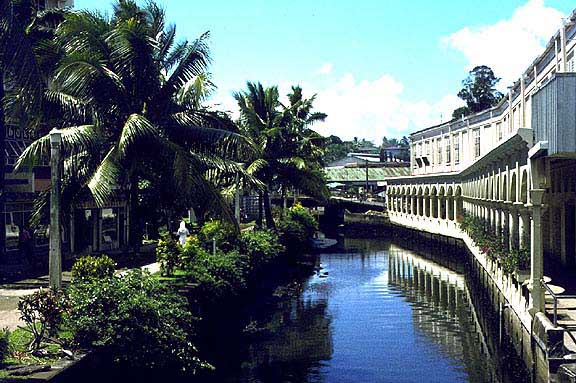
Nicholas J. Goetzfrid joined the Peace Corps and moving from the depths of an upper mid-west winter in January 1983 to the tropics of the Fiji Islands
Nicholas J. Goetzfridt, Ph.D.
University of Guam
ngoetzfr@uog9.uog.edu
My origins are from the Mesabi Iron Range in northeastern Minnesota where I lived until I was twenty. I moved "south" to Duluth, Minnesota in 1973 to attend the University of Minnesota - Duluth from which I graduated in 1977 with a B.A. in English/ Journalism and a minor in Psychology. I eventually moved to Milwaukee, Wisconsin where I attended the University of Wisconsin-Milwaukee while cleaning a bar, driving a truck, and teaching English. I graduated with an M.A. in English in 1981 and taught for two years at the University of Wisconsin-Parkside and Concordia College before joining the Peace Corps and moving from the depths of an upper mid-west winter in January 1983 to the tropics of the Fiji Islands. I taught English at The University of the South Pacific to students of a wide range of South Pacific ethnic backgrounds including indigenous Fijians, Indo-Fijians (whose ancestors were brought from India by the British a hundred years ago to work on British sugar cane plantations), Samoans, Tongans, and students of several other ethnic origins. I also taught distance education courses through use of the Pacific designated "Peacesat" and spent a summer in the country of Vanuatu (a two hour flight straight west of Fiji) where I taught English as a second language to students from Vanuatu and New Caledonia.
My multicultural experience was permanently extended when I eventually married into an Indo-Fijian family - a choice that has since enriched my life immeasurably with a strong multicultural perspective on life. I periodically make visits back to sugar cane lands of Sabeto, Fiji on Viti Levu island to see relatives. Upon our return to "the states," I enrolled in the MLS program at the University of Wisconsin-Madison and I worked as a project assistant for the Dictionary of American Regional English project for one year and as a cataloger of rare pamphlets at the State Historical Society of Wisconsin for another year.
Upon graduating in December 1986, I came to the University of Guam where I have since been working as a reference department coordinator, periodicals librarian and most recently as a collection development librarian. I have published reference books with Greenwood Press in the areas of Micronesia social bibliography, indigenous noninstrumental navigation (CHOICE Outstanding Academic Book List, 1993), and indigenous Oceanic literature. I am now working with Dr. Karen Peacock, Curator of the University of Hawai'i's Pacific Collection, on a Micronesia history book.
>From 1994 to 1997 I pursued my doctorate (received in December 1997) in library and information science at the University of Wisconsin-Madison's School of Library and Information Studies with a U.S. Department of Education fellowship and a position managing the Woodman Astronomical Library at the University of Wisconsin's Department of Astronomy. My dissertation is entitled "Tacking into Context: The Roots of LSCA Public Library Services in Micronesia Among the Heritages and Changes of an Ocean World" and it is representative of my interests in the area of "technology ideology" or, as Schoenhoff (1993) describes it, the "jagged edges" between the transfer of technology to "third world" environments and indigenous, communal contexts.
"Tacking into Context" demonstrates that while Micronesia (formerly the U.S. Trust Territory of the Pacific Islands) has been extensively influenced and changed by an American presence, leading to both negative and positive consequences, orality is still a fundamental phenomenon of Micronesian societies. This persistence of traditional mediums and means for conveying information and knowledge conflicts with equally traditional concepts of "the library" in American society which was transferred into Micronesia through the Library Services and Construction Act in 1966. The historical treatment of this transference allows also for an examination of social contexts in relation to information use and information relevance. Since receiving my Ph.D., I have been looking into how specific Micronesian ethnic groups transfer these traditional modes and structures of information into a new environment such as Guam to which many Micronesians have migrated since the mid-1980's.
I am not an anti-technologist and I find it unfortunate that many librarians tend to identify individuals and their perspectives as being with either the majority - the supporters and players in applications of information technology to the libraries - or with the minorities that have yet to accept the inevitable passing of the book. I myself use the Internet, CD-ROMS, etc. constantly in reference and bibliographic instruction programs and I look forward to the day when the Internet or its subsequent form is not only authoritatively indexed (and I hope that day will come) but when all classes of citizens have real, equitable access to technological forms of information that is relevant to them. Meanwhile, acknowledging and studying the social and individualized contexts into which technology is either already used or is to be introduced will provide richness to an otherwise impoverished perspective.
